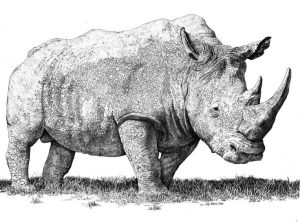What is a Rhino in Politics?
What is a Rhino in Politics
In politics, the term "rhino" is an acronym that stands for "Republican in Name Only." It is used to describe a member of a political party, typically the Republican Party in the United States, who is perceived as not adhering to or deviating from the core principles and values of the party.
A "rhino" is often seen as someone who takes positions or supports policies that are at odds with the traditional conservative or Republican platform. The term is often used pejoratively by more conservative members of a political party to criticize individuals they believe are too moderate, compromising, or willing to work with members of the opposing party. Essentially, it's a way to label someone as not a true or faithful representative of the party's values.
It's important to note that the term "rhino" is highly subjective and can be used in a partisan manner. Those accused of being "rhinos" may argue that they are taking a pragmatic or centrist approach to governance, while their critics believe they are betraying party principles. It is one of many labels and terms used in political discourse to describe ideological differences and divisions within a political party.
https://www.youtube.com/watch?v=qOvodwm-PP4The Origin of the Term "Rhino" in Politics
To understand what a Rhino is in politics, we first need to explore the origin of this term. "Rhino" is an abbreviation for "RINO," which stands for "Republican In Name Only" or "Democrat In Name Only," depending on the context. This term emerged to describe politicians who claim affiliation with a particular political party but deviate from the party's core principles.
[caption id="attachment_287" align="aligncenter" width="362"] rhino in politics[/caption]
rhino in politics[/caption]
Characteristics of a Political Rhino
Rhinos often exhibit distinct characteristics that set them apart from their party's mainstream members. These characteristics may include a willingness to compromise with the opposing party, advocating for policies not aligned with their party's platform, or maintaining a more moderate stance. Don’t Forget to Check Out Our Website: universalbrowse
Different Types of Rhinos in Politics
Rhinos are not a monolithic group; they come in various types, each with its own set of beliefs and principles. Some common types of Rhinos include the Conservative Rhino, Liberal Rhino, and Independent Rhino. Each type has its unique approach to politics.
Conservative Rhino
Conservative Rhinos are often found within the Republican Party. They tend to adopt a more centrist or liberal stance on social or economic issues, causing tension with their more conservative party peers.
Liberal Rhino
On the other side of the spectrum, Liberal Rhinos are Democrats who lean more conservative on specific issues. They may, for instance, support gun rights or fiscal responsibility, which can put them at odds with their party's traditional platform.
Independent Rhino
Independent Rhinos do not strictly align with either major party. They often take positions that transcend traditional party lines and may caucus with different parties on various issues.
The Role of Rhinos in Political Parties
Rhinos play a unique role in political parties. While some view them as disruptors who dilute party unity, others see them as bridge builders who can reach across the aisle to find common ground. They often hold the power to swing votes on crucial legislation.
Historical Examples of Rhinos in Politics
To better understand the concept of Rhinos, it's essential to look at historical examples. Some notable figures that fit the Rhino profile include Nelson Rockefeller, Joe Lieberman, and Arlen Specter. These individuals made significant impacts on American politics.
Nelson Rockefeller
Nelson Rockefeller, a prominent Republican Rhino, served as the Vice President under President Gerald Ford. He was known for his liberal positions on social issues, which sometimes clashed with the conservative wing of the Republican Party.
Joe Lieberman
Joe Lieberman, a Democrat Rhino, gained fame for his independent stance on various issues, including his support for the Iraq War. His positions led to his nomination as Al Gore's running mate in the 2000 presidential election.
Arlen Specter
Arlen Specter, a Republican Rhino, frequently crossed party lines to support legislation that aligned with his beliefs. His moderate stance on issues like abortion and healthcare made him a controversial figure within his party.
Rhinos vs. Partisan Politics
The presence of Rhinos in politics raises questions about the effectiveness of partisan politics. While some argue that they contribute to a more balanced and pragmatic approach to governance, others claim they undermine party ideologies.
The Controversy Surrounding Rhinos
The existence of Rhinos in politics has sparked significant controversy and debate. Critics argue that they are traitors to their party, while defenders see them as pragmatists working towards the greater good.
Criticisms
Critics often accuse Rhinos of betraying their party's trust and voters by not adhering to the party's platform. They argue that Rhinos should either embrace the party's core principles or leave.
Defenses
Defenders of Rhinos assert that they bring diversity of thought to their parties, fostering compromise and unity. They believe that Rhinos play a crucial role in bridging political divides and finding common ground.
Impact on Policy-Making
Rhinos can significantly influence policy-making. Their willingness to work with members of the opposing party can lead to bipartisan legislation and compromise, sometimes resulting in groundbreaking changes in law.
[caption id="attachment_288" align="aligncenter" width="374"] politics[/caption]
politics[/caption]
The Rhino Effect on Elections
Rhinos can also impact elections. Their appeal to moderate or independent voters can make a difference in tightly contested races, helping secure victories for their party.
The Future of Rhinos in Politics
As politics continue to evolve, the role of Rhinos remains a topic of interest. The future may hold changes in party dynamics and the ways Rhinos are perceived and integrated into the political landscape.
Conclusion
In conclusion, a Rhino in politics is not a species of animal but rather a unique breed of politicians who challenge the traditional party lines. They bring diversity of thought, compromise, and bipartisanship to the political arena, but they are not without controversy. The influence of Rhinos on policy-making and elections cannot be underestimated, making them a compelling and essential part of modern politics.
FAQs
Q. What is the origin of the term "Rhino" in politics?
A. The term "Rhino" in politics originates from the abbreviation "RINO," which stands for "Republican In Name Only" or "Democrat In Name Only," depending on the context. It's used to describe politicians who claim affiliation with a particular political party but deviate from the party's core principles.
Q. Are Rhinos limited to the United States, or are they found in other countries?
A. Rhinos, in the context of politics, are primarily associated with the United States. However, similar figures can be found in other countries as well, where politicians may diverge from their party's core ideologies.
Q. How do Rhinos affect the legislative process?
A. Rhinos can significantly influence the legislative process by bridging the gap between parties and fostering compromise. Their willingness to work with members of the opposing party can lead to bipartisan legislation and, at times, groundbreaking changes in law.
Q. Can Rhinos change the course of elections?
A. Yes, Rhinos can have an impact on elections. Their appeal to moderate or independent voters can make a difference in tightly contested races, potentially helping their party secure victories.
Q. Are there any famous Rhinos in current politics?
A. The presence of Rhinos in current politics may vary. The political landscape is dynamic, and individual politicians may align more or less with their party's principles at different times. As such, the identification of Rhinos can change over time.
